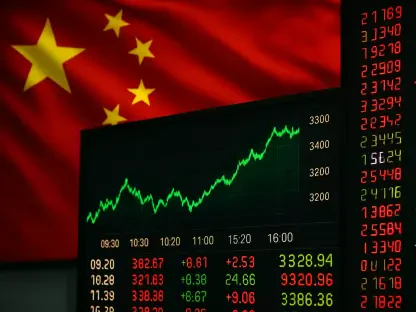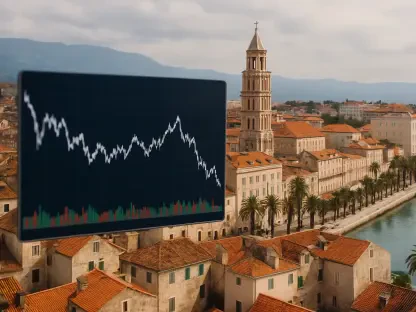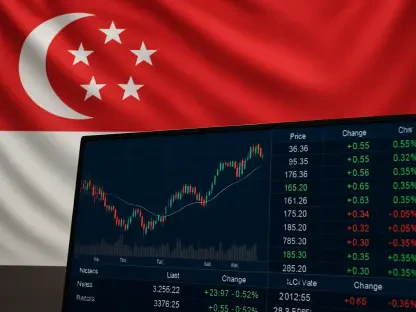What does it take to topple the world’s richest person, even for just a few hours? In a financial clash that gripped headlines, tech titan Larry Ellison momentarily eclipsed Elon Musk in the wealth rankings, only for Musk to reclaim his throne by the day’s close. This high-stakes drama, fueled by soaring stock prices and the relentless pace of tech innovation, offers a glimpse into the volatile world of billionaire fortunes. It’s a story not just of numbers, but of the seismic shifts in technology that can rewrite the pecking order in an instant.
The Stakes of a Financial Flip
This brief switch at the top isn’t mere gossip for the ultra-rich; it signifies deeper currents in the global economy. The rivalry between Musk and Ellison underscores how wealth today is tied to technological breakthroughs, particularly in artificial intelligence (AI), and the whims of investor sentiment. For anyone watching the tech industry or the broader market, this moment serves as a reminder of how swiftly fortunes can pivot, reflecting the immense power and unpredictability of innovation-driven sectors.
Beyond the personal triumph or setback, this event highlights a critical trend: the race to dominate AI and cloud infrastructure is reshaping who holds economic power. Ellison’s ascent, even if temporary, signals a shift in focus toward companies delivering tangible results in these cutting-edge fields. Meanwhile, Musk’s challenges reveal the risks of betting big on a single volatile industry like electric vehicles, where public perception can weigh as heavily as product performance.
Oracle’s Triumph and Tesla’s Turbulence
On the day of the dramatic shift, Oracle Corporation’s stock skyrocketed by 36%, closing at $328.33, propelled by an earnings report that stunned Wall Street with over $300 billion in new deals. Contracts with heavyweights like OpenAI, Meta, Nvidia, and even Musk’s xAI added nearly $100 billion to Ellison’s net worth in minutes. This surge reflected a clear investor belief in Oracle’s central role in powering the AI revolution, a sector poised to redefine industries from healthcare to finance.
In stark contrast, Tesla, the cornerstone of Musk’s wealth, has stumbled under mounting pressures. A 14% drop in stock value this year, coupled with a staggering 40% sales decline in the European Union over seven months, has dented confidence. Public controversies, including Musk’s outspoken political views on social platforms and alignment with polarizing figures, have further eroded customer loyalty, costing Tesla market share in critical regions like the U.S. and Europe.
By the close of trading, the numbers told a razor-thin tale: Musk’s net worth stood at $384.2 billion, just ahead of Ellison’s $383.2 billion, according to Bloomberg’s estimates. This narrow gap illustrates not only the fragility of such rankings but also the intense competition driving these tech giants to push boundaries, for better or worse, in their respective domains.
Voices from the Titans Themselves
During a recent earnings call, Larry Ellison, at 81, painted a bold vision of AI as the ultimate game-changer, capable of automating everything from factory floors to drug discovery. His confidence in Oracle’s trajectory, with projected revenue growth from $18 billion to $144 billion by 2029, resonated with investors betting on the company’s partnerships and infrastructure. Ellison’s words framed AI not just as a tool, but as the foundation of future economies, positioning Oracle at the forefront.
On the other side, Musk has doubled down on pivoting Tesla toward robotics and AI innovations like robotaxis, aiming to shift focus from slumping electric vehicle sales. Yet, analysts remain skeptical, pointing to the absence of a clear recovery plan for Tesla’s core business. Musk’s ambitious rhetoric often clashes with market realities, leaving investors questioning whether his futuristic bets will pay off amid current struggles.
These contrasting perspectives—Ellison’s grounded optimism versus Musk’s speculative boldness—capture the divergent paths of two visionaries. Their words and strategies, echoed in market reactions, reveal how leadership style and corporate focus can sway billions in wealth overnight, shaping not just their legacies but the direction of entire industries.
Decoding the Tech Wealth Rollercoaster
Understanding this wealth flip requires a closer look at market volatility, a force that can elevate or sink fortunes in hours. Stock performance, tied to investor confidence in sectors like AI and cloud computing, dictates these rankings more than ever. For those tracking financial trends, keeping tabs on tech breakthroughs and earnings reports offers clues to the next big shift in billionaire standings.
Another layer to consider is the strength of a company’s fundamentals. Oracle’s surge stems from concrete achievements—massive contracts and proven growth—while Tesla’s woes highlight the pitfalls of unfulfilled promises in speculative fields like robotics. For professionals or investors in tech, prioritizing firms with immediate, measurable impact over those banking on distant horizons might prove a wiser strategy.
Finally, the role of public perception cannot be ignored. Musk’s personal controversies have tangible effects on Tesla’s brand, proving that leadership behavior can ripple through balance sheets. Whether as a consumer or stakeholder, recognizing how a CEO’s actions influence trust and loyalty remains crucial in navigating the unpredictable terrain of tech-driven wealth.
Reflections on a Fleeting Financial Crown
Looking back, the momentary dethroning of Elon Musk by Larry Ellison stood as a striking testament to the fragility of wealth in the tech era. It was a day when stock surges and strategic wins briefly rewrote the hierarchy, only to snap back under the weight of persistent challenges. This episode illuminated the profound impact of AI and market dynamics on personal fortunes, painting a vivid picture of competition at the highest echelons.
For those intrigued by this clash of titans, the takeaway was clear: staying informed about technological trends and corporate milestones offers a window into future power shifts. Engaging with industry news, analyzing earnings data, and weighing the influence of public sentiment can equip anyone to anticipate the next big change. As the tech landscape continues to evolve, tracking these forces remains essential to understanding who might claim, or lose, the crown tomorrow.









